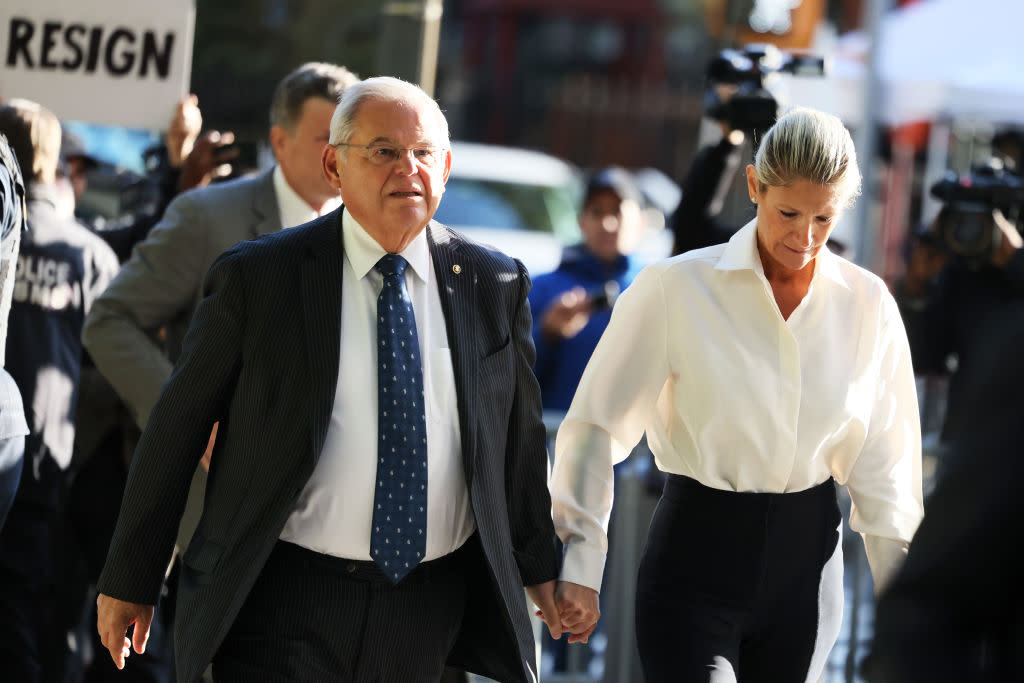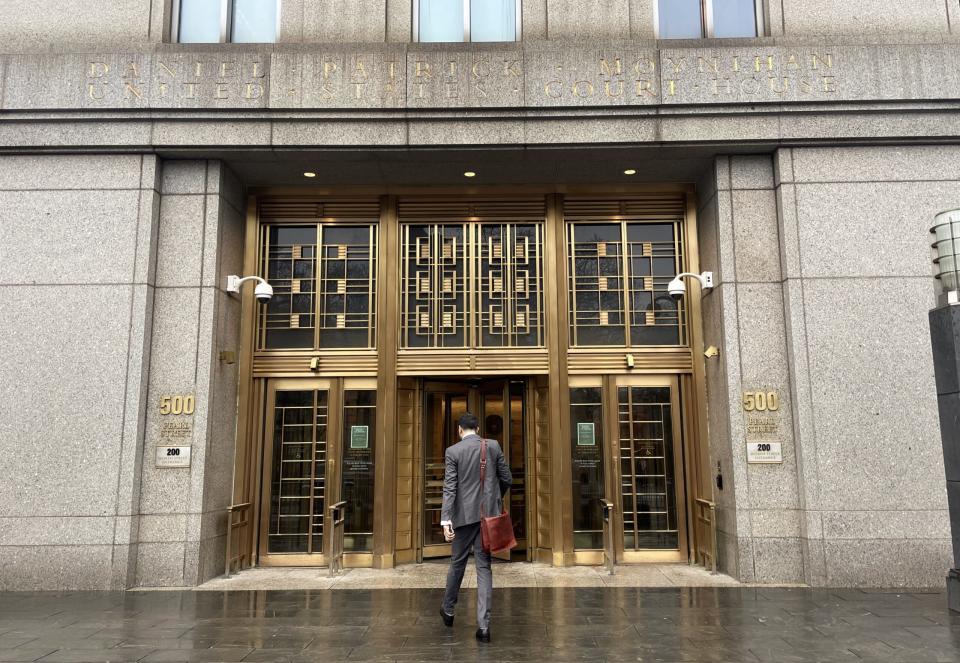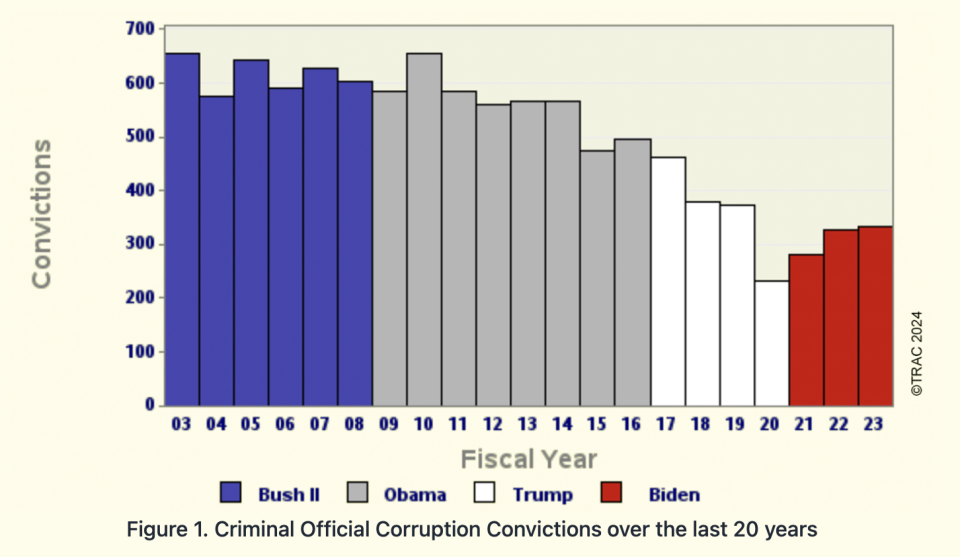Sen. Bob Menendez’s corruption trial begins Monday in Manhattan

- Oops!Something went wrong.Please try again later.
Sen. Bob Menendez and two co-defendants are scheduled to stand trial beginning Monday, May 13, 2024, on corruption charges in Manhattan. (Michael M. Santiago | Getty Images)
The federal corruption trial of Sen. Bob Menendez will begin Monday morning in a Manhattan courtroom, where prosecutors will seek to prove New Jersey’s senior senator took bribes of gold bars, cash, a luxury car, and more in exchange for his influence to aid several businessmen and the governments of Egypt and Qatar.
The trial comes in the wake of a string of U.S. Supreme Court rulings that have made it tougher for prosecutors to prove public corruption — and for those rare indictments to stick.
But it also takes place in a jurisdiction where federal prosecutors have been among the most successful in the nation in securing official corruption convictions.
That makes the outcome of the case a total toss-up, said Thea Johnson, a professor of law at Rutgers Law School in Camden and a former defense attorney.
“The government is saying that this was a bribery scheme where there was a very direct trade of cash, gold bars, a car, and a no-show job for his wife in exchange for pretty significant favors that only a senator could achieve … they seem to be pretty clear quid pro quo bribery payments,” Johnson said. “Still, this is a jury trial. And the truth of the matter is that juries are always an open question.”
Matthew Hale, a political science and public affairs professor at Seton Hall University, seconded that sentiment.
“You can never count on how the 12 people in the courtroom, who will sit down and hear the totality the argument, will decide,” Hale said.
First, some background
Federal prosecutors in New York first indicted Menendez, a three-term Democratic senator, in September. They charged him then and in several subsequent superseding indictments with bribery, extortion, honest services wire fraud, obstruction of justice, conspiracy, and acting as a foreign agent for offenses they say occurred between 2018 and last year.
Two businessmen, Wael Hana and Fred Daibes, will stand trial with Menendez, who helmed the powerful Senate Foreign Relations Committee until he stepped down shortly after his indictment.
Hana is an Egyptian immigrant who prosecutors say bribed the senator with gold bars and cash and gave his wife Nadine a no-show job at his halal meat company in order to steer military aid and arms to Egypt, secure information about staffing at the U.S. Embassy in Cairo to share with Egyptian officials, and otherwise help the Egyptian government.
Daibes is a real estate developer and bank founder in Edgewater accused of bribing Menendez with gold bars and cash to interfere in a federal bank fraud case he faced and to publicly support the Qatari government so that a Qatari investment company would invest in one of Daibes’ properties.
Prosecutors say Nadine Menendez acted as intermediary in many of the schemes and charged her too, but Judge Sidney H. Stein postponed her trial to July as she deals with an undisclosed medical crisis.
A third businessman, Jose Uribe of Clifton, is accused of giving Nadine Menendez cash for a new Mercedes-Benz convertible to replace one she wrecked when she hit and killed a pedestrian. Uribe, a former insurance broker who’s accused of asking the senator to intervene in an insurance fraud probe, pleaded guilty in March and is expected to testify against his co-defendants.
One should be nervous when the U.S. Attorney’s Office for the Southern District of New York comes after you.
– Thea Johnson, a professor of law at Rutgers Law School in Camden
Attorneys have said they expect the trial — before Stein at the Daniel Patrick Moynihan federal courthouse — will last at least six weeks.
This is Menendez’s second fight against bribery charges in less than a decade — his 2017 trial on allegations he traded favors for campaign donations and extravagant trips ended in a mistrial after the jury deadlocked.
Public corruption tougher to prove
Convictions for official corruption aren’t common — there’s only one for every million people in the U.S. — and they’ve steadily dropped over the past two decades, federal data shows.
Susan B. Long tracks such convictions nationally as co-founder and co-director of the Transactional Records Access Clearinghouse, a nonpartisan, nonprofit research center affiliated with Syracuse University.
“Official corruption prosecutions and convictions have been declining long-term. But that’s not necessarily because there’s less official corruption going on,” Long said.
Such convictions fell by half since 2003, when there were more than 600 nationally, to just over 300 last year, with a two-decade low of about 250 in 2020 at the height of pandemic-driven government shutdowns, the center found. Twice as many local public officials were convicted last year as either state or federal officials, data shows.
Multiple factors could be fueling the decline, including the strength of evidence, under-funded prosecutors, well-resourced defendants, and outside challenges prosecutors face in securing convictions, Long said.
One of those outside challenges in recent years has been the U.S. Supreme Court, which has set precedents, by overturning several corruption convictions, that observers say make such cases tougher to prosecute.
In 2016, the court unanimously overturned former Virginia Gov. Bob McDonnell’s 2014 corruption conviction, saying that while his acceptance of $175,000 in gifts from a businessman was “distasteful,” prosecutors too broadly interpreted both the federal bribery statute and what constitutes “government favors” and “official acts.”
Closer to home, the U.S. Supreme Court in 2020 tossed the convictions of two Christie administration aides in the Bridgegate scandal, saying they didn’t violate federal fraud laws because their goal wasn’t to get money or property. And last year, the justices overturned the fraud conviction of former Gov. Andrew Cuomo’s manager Joseph Percoco, faulting a judge’s instructions to jurors as “too vague.”
Attorney Jonathan Kravis is a former federal prosecutor who served as deputy chief of the fraud and public corruption section of the U.S. Attorney’s Office in Washington, D.C. He now works at the D.C.-based firm Munger, Tolles & Olson.
“The theme underlying these cases is that the courts are very concerned about the possibility that expansive interpretation of the federal criminal public corruption statutes will end up chilling or even criminalizing politics as usual,” Kravis said. “The reality is we have a campaign finance system where campaigns are largely funded through private contributions from people who have views that are like-minded with the candidates they’re supporting and they expect that they’ll be giving contributions to people who will advance their interests. In that kind of system, how do you avoid the possibility of federal criminal statutes chilling protected activity, chilling the day-to-day work of our political system?”
While jurors might fixate on the gold bars and other riches investigators found in the Menendezes’ Englewood Cliffs home, the case more likely will hinge on what acts prosecutors can prove Menendez did, Kravis said.
“It doesn’t matter if it was hundreds of thousands of dollars in payments or just a few thousand,” he said. “From a legal perspective, if you’re thinking about whether the conduct is a crime, what’s going to matter far more is what the government can show about what’s on the other side of the equation — the senator’s conduct, and whether the conduct constitutes an official act or violation of official duty, and whether the government can show that there was a corrupt quid pro quo exchange of one for the other.”
How the trial may unfold
Jury selection is expected to begin Monday.
Menendez and his co-defendants arguably are in the worst jurisdiction if they hope to walk free. Long’s center found that the Southern District of New York, where they’re being prosecuted, secured more official corruption convictions than any other federal jurisdiction nationally last year, with 24.
“They tend to take big swings. They’re not afraid of taking major cases to trial. They’re not afraid of indicting famous people, indicting people with power. And so one should be nervous when the U.S. Attorney’s Office for the Southern District of New York comes after you,” Johnson said.
Still, Menendez scored an early victory when Stein agreed to separate his trial from his wife’s, because it eliminated the possible scenario of jurors hearing spouses testify against each other at the same trial, Kravis said. Severing the trials also made it likelier that the senator would take the stand, he added.
“Unlike many other criminal defendants, public officials are good public speakers. They’re charismatic; like they got to this point in their careers for a reason. And so they can be more influential as witnesses in front of juries than defendants who have not made their careers out of talking to crowds and making connections with people,” Kravis said. “If he testifies, then I think that will probably be the pivotal moment in the trial.”
Public corruption trials often come down to corrupt intent, and Kravis predicted Menendez’s legal team will deny any nefarious intent.
Court filings show that the defense team might try to explain away the cash-stuffed pockets of Menendez’s jackets and other riches investigators found in his home as an “intergenerational trauma” response rooted in the senator’s experience as a Cuban refugee and fears of government seizures.
Defense attorneys also have hinted that the senator might blame his wife for his legal predicament and say she withheld information about the nature of the meetings she arranged. Johnson thinks that’s a bad strategy.
“This is a 70-year-old sitting senator. It’s his responsibility to do his due diligence. It’s his responsibility to make sure — particularly given prior allegations against him — that he is only engaged in absolutely up-and-up behavior, that he is holding himself to the highest standards of integrity,” Johnson said. “I am not sure that I would think, if I were his defense attorney, that it would be a particularly fruitful argument to say, ‘Oh, I was misled by my wife.’ We expect our senators to be thoughtful, to be smart, and not misled by people around them.”
GET THE MORNING HEADLINES DELIVERED TO YOUR INBOX
The post Sen. Bob Menendez’s corruption trial begins Monday in Manhattan appeared first on New Jersey Monitor.



